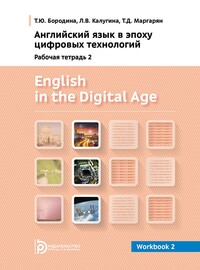English in the Digital Age. Workbook 2 = Английский язык в эпоху цифровых технологий. Рабочая тетрадь 2
Покупка
Тематика:
Английский язык
Год издания: 2019
Кол-во страниц: 40
Дополнительно
Вид издания:
Практикум
Уровень образования:
ВО - Бакалавриат
ISBN: 978-5-7038-5326-9
Артикул: 840487.01.99
Рабочая тетрадь Workbook 2 разработана для самостоятельной работы студентов с целью качественной подготовки к аудиторным занятиям при работе с мультимедийным учебным пособием English in the Digital Age, Student’s Book 2. Издание содержит разнообразные упражнения, при выполнении которых студенты закрепляют навыки, полученные во время аудиторных занятий, повторяют грамматический материал, расширяют лексический запас и развивают навыки самостоятельного поиска нужной информации в англоязычной информационно-образовательной среде. Для студентов младших курсов технических учебных заведений.
Тематика:
ББК:
УДК:
- 378: Высшее профессиональное образование. Высшая школа. Подготовка научных кадров
- 811111: Английский язык
ОКСО:
- ВО - Бакалавриат
- 09.03.01: Информатика и вычислительная техника
- 09.03.02: Информационные системы и технологии
- 09.03.03: Прикладная информатика
- 11.03.02: Инфокоммуникационные технологии и системы связи
ГРНТИ:
Скопировать запись
Фрагмент текстового слоя документа размещен для индексирующих роботов
Т.Ю. Бородина, Л.В. Калугина, Т.Д. Маргарян English in the Digital Age Workbook 2 Английский язык в эпоху цифровых технологий Рабочая тетрадь 2 Практикум Федеральное государственное бюджетное образовательное учреждение высшего образования «Московский государственный технический университет имени Н.Э. Баумана (национальный исследовательский университет)»
УДК 81:378 (075)
ББК 81.2Англ
Б83
Издание доступно в электронном виде по адресу
https://bmstu.press/catalog/item/6467/
Факультет «Лингвистика»
Кафедра «Английский язык для машиностроительных специальностей»
Рекомендовано Научно-методическим советом МГТУ им. Н.Э. Баумана
в качестве практикума
Бородина, Т. Ю.
English in the Digital Age. Workbook 2 = Английский язык в эпоху цифровых технологий. Рабочая тетрадь 2 : практикум / Т. Ю. Бородина, Л. В. Калугина, Т. Д. Маргарян. — Москва : Издательство МГТУ им. Н. Э. Баумана, 2019. — 37, [3] с.
ISBN 978-5-7038-5326-9
Рабочая тетрадь Workbook 2 разработана для самостоятельной работы студентов
с целью качественной подготовки к аудиторным занятиям при работе с мультимедийным учебным пособием English in the Digital Age, Student’s Book 2. Издание содержит разнообразные упражнения, при выполнении которых студенты закрепляют
навыки, полученные во время аудиторных занятий, повторяют грамматический материал, расширяют лексический запас и развивают навыки самостоятельного поиска
нужной информации в англоязычной информационно-образовательной среде.
Для студентов младших курсов технических учебных заведений.
УДК 81: 378 (075)
ББК 81.2 Англ
ISBN 978-5-7038-5326-9
© МГТУ им. Н.Э. Баумана, 2019
© Оформление. Издательство
МГТУ им. Н.Э. Баумана, 2019
Б83
Предисловие Рабочая тетрадь Workbook 2 разработана к мультимедийному учебному пособию English in the Digital Age. Student’s Book 2 для самостоятельной работы студентов. Издание состоит из трех модулей, которые соответствуют модулям 4–6 пособия для аудиторной работы. Упражнения в каждом уроке модулей подобраны в соответствии с уроками пособия, разработанного для аудиторной работы. Студенты могут самостоятельно выполнять эти упражнения как до аудиторного занятия в целях повторения грамматических структур и лексики, так и после занятия — для закрепления полученных навыков. Важно выработать привычку систематически выполнять задания, предлагаемые в рабочей тетради, что будет способствовать лучшему усвоению материалов модуля. Для проверки своих знаний и степени готовности к рубежному контролю в рабочей тетради приведены проверочные работы к каждому модулю. Задания в этих проверочных работах аналогичны заданиям, выдаваемым преподавателем на рубежном контроле, поэтому каждый студент имеет возможность оценить степень своей готовности к контрольным мероприятиям и определить тот грамматический или лексический материал, над которым необходимо поработать дополнительно.
Список сокращений Грамматические термины a (adjective) — имя прилагательное adv (adverb) — наречие conj (conjunction) — союз n (noun) — имя существительное prep (preposition) — предлог pron (pronoun) — местоимение v (verb) — глагол Аббревиатуры abbr. (abbreviation) — аббревиатура etc. (abbr. for et cetera = and other similar things) — и так далее e.g. (abbr. for exempli gratia = Latin for ‘for example’) — к примеру Ofcom (abbr. for Office of Communications. Ofcom is the UK government-approved regulatory and competition authority for the broadcasting, telecommunications and postal industries of the United Kingdom) — Управление по делам радио, телевидения и предприятий связи UK (abbr. United Kingdom) — Соединенное Королевство (офиц. название Соединенное Королевство Великобритании и Северной Ирландии) IoT (abbr. for Internet of Things) — Интернет вещей. Концепция вычислительной сети физических предметов (‘вещей’), оснащенных встроенными технологиями для взаимодейст- вия друг с другом или внешней средой PC (abbr. for ‘personal computer’) — персональный компьютер IT (abbr. for ‘information technology’) — информационные технологии AI (abbr. for ‘artificial intelligence’) — искусственный интеллект ML (abbr. for ‘machine learning’) — машинное обучение RAM (abbr. for Random Access Memory) — память с произвольным доступом или оперативное запоминающее устройство CIA (abbr. for Central Intelligence Agency) – Центральное Разведывательное Управление США ENIAC (abbr. for ‘Electronic Numerical Integrator and Computer’ the first electronic general-purpose computer) — ЭНИАК, электронный числовой интегратор и вычислитель LIGO (Laser Interferometer Gravitational-Wave Observatory) — Лазерно- интерферометрическая гравитационно-волновая обсерватория CalTech (California Institute of technology) — Калифорнийский технологический институт MIT (Massachusetts Institute of Technology) — Массачусетский технологический институт TASS (Russian News Agency. The TASS name comes from the former Telegraph Agency of the Soviet Union) — ТАСС, Телеграфное Агентство Советского Союза ISS (International Space Station) — МКС, Международная космическая станция


